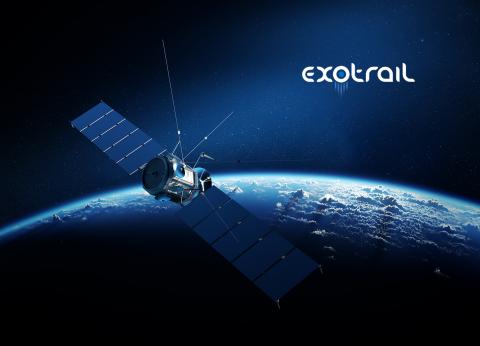
Exotrail: the success story of a deep tech start-up which almost never saw the light of day
The creation and success of Exotrail, the technology for which was developed in the GEMAC laboratory (Université Paris-Saclay, UVSQ, CNRS) and the Centre national d’études spatiales (CNES - National Centre for Space Studies), is the result of a combination of circumstances, an innovative financing scheme and new technology. Today, it is one of the most promising “New Space” deep tech start-ups in France.
It all began with a chance meeting. In 2007, Marcel Guyot, a researcher at the Groupe d’études de la matière condensée (Condensed Matter Study Group, GEMAC - Université Paris-Saclay, UVSQ, CNRS) filed, on behalf of CNRS, UVSQ and CNES, a patent for a Hall-effect ion thruster. This system allows xenon ions to be propelled at high speed and is used in the space industry - in particular when changing a satellite's position when in orbit around the Earth. Thanks to this innovation, Marcel Guyot invented the first miniaturised Hall-effect motors, which in turn allowed them to be used in small satellites.
In 2014, he presented his work during a seminar hosted by the École polytechnique. Jean-Luc Maria was also attending the event that day. This engineer from the Versailles-Saint-Quentin Observatory (OVSQ - Université Paris-Saclay, UVSQ, CNRS), in charge of managing PIT (the integration and testing platform), was fascinated by the innovation being showcased. He explains, “Marcel was a specialist in the field of materials and not at all an expert in space equipment like me. Thanks to this unexpected meeting and the pooling of our expertise, without which nothing would have been possible, we set about designing miniature electric thrusters for small satellites.” They then joined forces in their laboratories to develop the system and also approached the SOLEIL synchrotron and the École polytechnique - as well as involving Paul Lascombes with their project (who was a student there at the time) in order to apply for funding. In 2015, they contacted the UVSQ and CNRS research valorisation units and responded to a call for maturation projects from SATT Paris-Saclay. This society for the acceleration of technology transfer was created in 2014 thanks to the “Investissements d'avenir” (Investing for the future) programme, and is an innovative tool for financing innovation in the Paris-Saclay cluster. It facilitates the transfer of technology resulting from publicly-funded research to the markets so that innovations can be developed.
Industrial development
Thanks to their combined efforts and the promising nature of their project, the three associates obtained finance and support. In this way, they managed to spearhead the development of a prototype electric thruster for small satellites. They formed a technology team and worked closely with experts in legal affairs, business intelligence, marketing, manufacturing and distribution. They also developed and formalised skills and expertise and results in partnership with the École polytechnique and the SOLEIL synchrotron. “Before the creation of SATT Paris-Saclay, we did not have the means to work on the valuation of intellectual property assets. This scheme, combined with a chance meeting between the key personalities, was therefore essential for Exotrail seeing the light of day,” points out Virginia Branco, director of development and innovation at UVSQ.
The birth and rise of Exotrail
This combination of factors and expertise resulted in the creation of the start-up in 2017. The thrusters that Exotrail develops for small satellites enable the satellites to optimise their orbits, increase their performance, avoid collisions and return to the atmosphere at the end of their life so as not to pollute space. Until quite recently, only large satellites incorporated thrusters using Hall-effect technology. Now, it is also possible for small satellites thanks to the miniature thrusters created by Exotrail.
Confident in this start-up’s strong potential, Jean-Luc Maria, who is currently on secondment from CNRS, now holds the position of Chief Technical Officer (CTO). Paul Lascombes is Chief Science Officer (CSO) and Nicolas Heitz is the Chief Operating Officer. David Henri, who is also a graduate from the École polytechnique is the fourth co-founder and is the Chief Executive Officer (CEO). Marcel Guyot is now retired.
Today, Exotrail has 30 employees and is developing fast. It has just raised €M11, which will help it to expand its product portfolio and increase its manufacturing and business development capabilities. The start-up, which includes Eutelsat and AAC Clyde Space as clients, has also just announced that it has been authorised by the European Space Agency (ESA) and the CNES to supply and further develop its electric propulsion systems. (ExoMG™ - nano and ExoMG™ - micro).
Exotrail is not intending to stop here. Since 2017, the start-up has been developing software alongside for the design, optimisation and operation of powered satellites. Eventually, it plans to develop propelled space vehicles which could have many uses, including the deployment of small satellites, inspection, repair and the controlled de-orbiting of debris. The company is already being supported by CNES in this. “With this additional innovation and the many opportunities it offers us, we want to move from being a thruster manufacturer to a more ambitious position as a supplier of complete agility solutions,” concludes Jean-Luc Maria.
